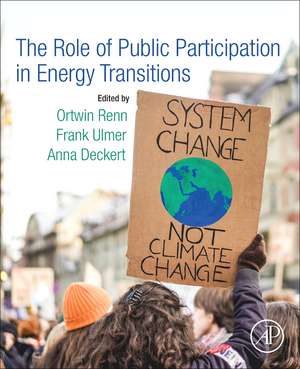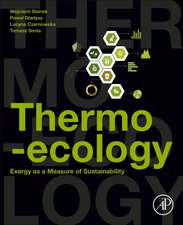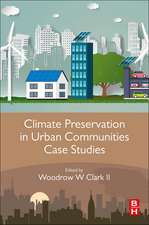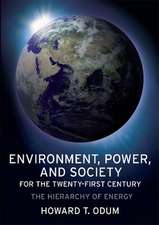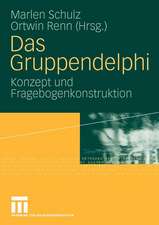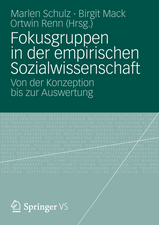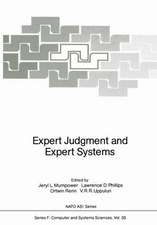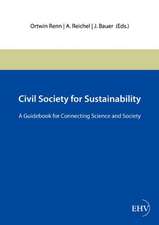The Role of Public Participation in Energy Transitions
Editat de Ortwin Renn, Frank Ulmer, Anna Deckerten Limba Engleză Paperback – 20 mar 2020
The book is a valuable resource for academics in the field of energy planning and policymaking, as well as practitioners in energy governance, energy and urban planners and participation specialists.
- Explains both key concepts in public participation and involvement, along with empirical results gained in implementing these concepts
- Links theoretical knowledge with conceptual and real-life applications in the energy sector
- Instructs energy planners in how to improve planning and transformation processes by using inclusive governance methods
- Contains insights from case studies in the fully transitioned German system that provide an empirical basis for action for energy policymakers worldwide
Preț: 572.46 lei
Preț vechi: 748.93 lei
-24% Nou
Puncte Express: 859
Preț estimativ în valută:
109.55€ • 113.95$ • 90.44£
109.55€ • 113.95$ • 90.44£
Carte tipărită la comandă
Livrare economică 07-21 aprilie
Preluare comenzi: 021 569.72.76
Specificații
ISBN-13: 9780128195154
ISBN-10: 0128195150
Pagini: 248
Ilustrații: 31 illustrations (1 in full color)
Dimensiuni: 191 x 235 x 24 mm
Greutate: 0.43 kg
Editura: ELSEVIER SCIENCE
ISBN-10: 0128195150
Pagini: 248
Ilustrații: 31 illustrations (1 in full color)
Dimensiuni: 191 x 235 x 24 mm
Greutate: 0.43 kg
Editura: ELSEVIER SCIENCE
Public țintă
Academics in the field of energy planning, governance and policy making. Practitioners in energy governance and policymakers. Energy planners, urban planners, participation specialistsCuprins
1. Introduction: Stakeholder involvement and public participation for designing energy policies
Part 1: Concepts of inclusive governance in the energy sector
2. A brief history of the German "Energiewende": Targets, programs and social resonance.
3. The six approaches to inclusive governance: foundations, applications and lessons learned
4. Energy Transition and Civic Engagement
5. From Coal to Renewables: Changing Socio—Ecological Relations of Energy in India, Australia and Germany
6. New Global Governance for Sustainable Global Energy Transformation: Democratic, Participatory-Deliberative, Multilayered
Part 2: Case Studies
7. The Kopernikus Project E-Navi: Linking science, business, and civil society
8. Climate change policies designed by stakeholder and public participation
9. Digital tools in stakeholder participation for the German Energy Transition. Can digital tools improve participation and its outcome?
10. Citizen Participation for wind energy: Experiences from Germany and beyond
11. The contact group – public participation in the distribution network expansion in Baden-Württemberg
12. Social sustainability: Making energy transitions fair to the people
13. Conclusions: Lessons learned
Part 1: Concepts of inclusive governance in the energy sector
2. A brief history of the German "Energiewende": Targets, programs and social resonance.
3. The six approaches to inclusive governance: foundations, applications and lessons learned
4. Energy Transition and Civic Engagement
5. From Coal to Renewables: Changing Socio—Ecological Relations of Energy in India, Australia and Germany
6. New Global Governance for Sustainable Global Energy Transformation: Democratic, Participatory-Deliberative, Multilayered
Part 2: Case Studies
7. The Kopernikus Project E-Navi: Linking science, business, and civil society
8. Climate change policies designed by stakeholder and public participation
9. Digital tools in stakeholder participation for the German Energy Transition. Can digital tools improve participation and its outcome?
10. Citizen Participation for wind energy: Experiences from Germany and beyond
11. The contact group – public participation in the distribution network expansion in Baden-Württemberg
12. Social sustainability: Making energy transitions fair to the people
13. Conclusions: Lessons learned
Recenzii
"This reviewer notes the strong role of the states in Germany, which may be typical of states or regions in other countries. In the USA for instance, such approaches could easily be used for renewable energy development in California and New York or British Columbia in Canada or possibly other regions in Europe. Certainly on the national level, Germany stands apart with their continued support for renewable energy development or “Energiewende as they call it. This book’s blurb stated would be useful for practitioners and energy planners, but it also could be used as a supplemental textbook for energy policy or participatory methods courses. This reviewer wished he had such a book that he could have used for a public participation and environmental mediation course that he taught." --Journal of Environmental Studies and Sciences
